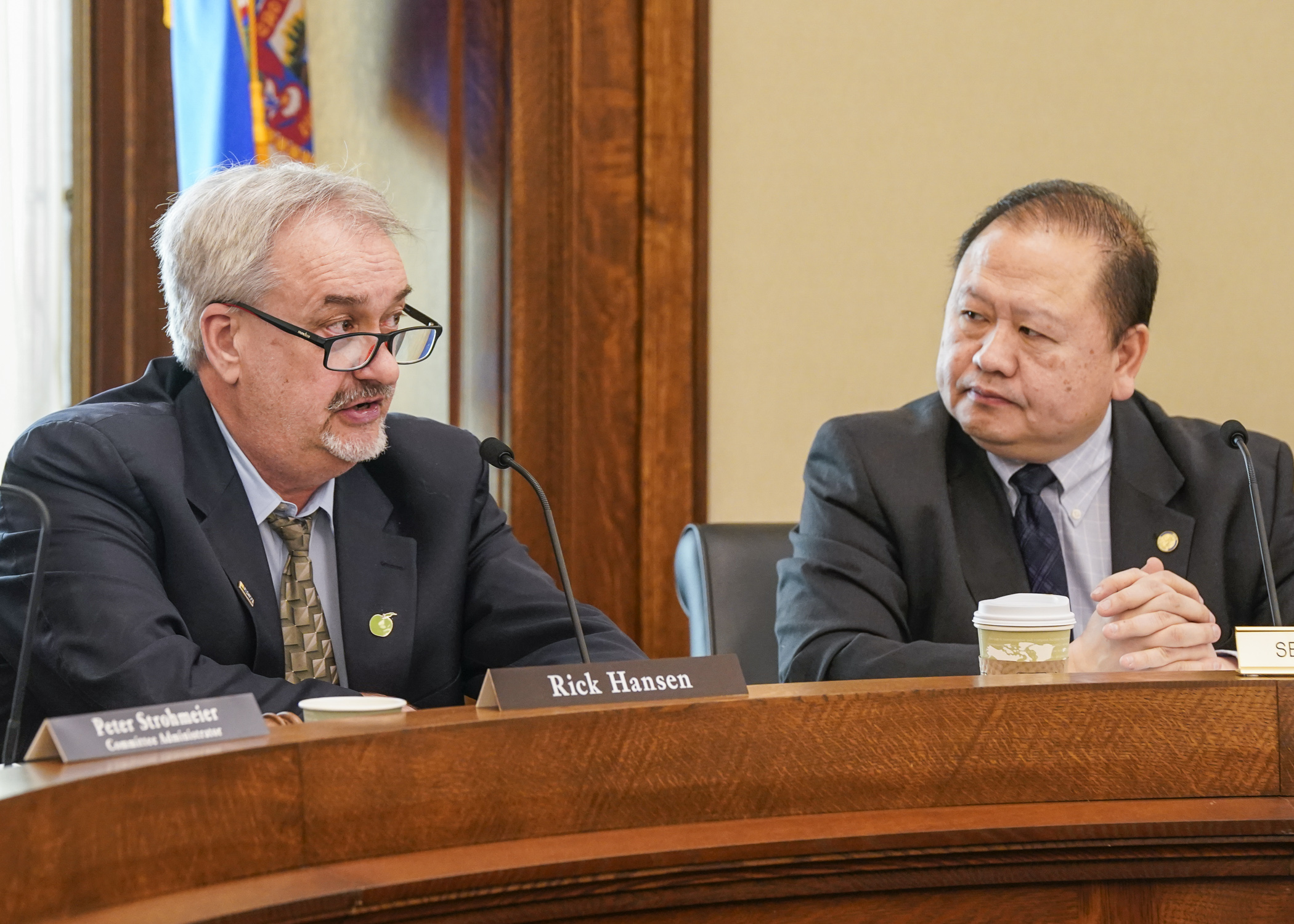Environment, energy conferees discuss differences in House and Senate bills

Judging from Monday’s stop-and-start meeting that began early and was scheduled to end late, the environment, natural resources, climate and energy conference committee plans to put a lot of energy into forging a compromise between the House and Senate proposals.
The meeting on HF2310 moved along in serialized fashion, multiple recesses interrupting nonpartisan staff running through the bills’ details and differences, and commissioners of state agencies dropping by to weigh in with what they liked about the bills. Rep. Rick Hansen (DFL-South St. Paul) and Sen. Foung Hawj (DFL-St. Paul) are the sponsors.
But here’s a summary of the differences between the version passed by the House and later amended by the Senate.
Environment and natural resources
The House and Senate bills are aligned in many ways, including beefed-up efforts to combat invasive species, remove hazardous materials from the environment, and upgrade Department of Natural Resources infrastructure. But the Senate bill contains $3.4 million more in appropriations.
House proposals to increase fees for fishing licenses, state park permits, and watercraft registration are among the biggest differences, with another point of contention being the House proposal to address historic inequities of pollutants by requiring the cumulative impact of pollution to be considered in permitting processes.
Here are some of the significant funding differences in the environment and natural resources area. The Senate proposes spending:
- $133.8 million more for a water infrastructure grant program;
- $53 million more for the Department of Natural Resources’ Get Out MORE program, aimed at upgrading outdoor recreation programs and facilities; and
- $18.7 million more for Board of Water and Soil Resources programs.
Meanwhile, the House bill would appropriate:
- $51 million more for emerald ash borer programs to respond to the disease, plant new trees and dispose of waste from diseased trees;
- $23.5 million more for parks, trails, inflow and infiltration programs managed by the Metropolitan Council;
- $9.9 million more for restoring wetlands in wildlife management areas; and
- $9 million in one-time dollars to the Science Museum of Minnesota to retire debt and rehire staff.
[MORE: See the environment and natural resource finance comparison spreadsheet]
Some provisions in both bills would:
- appropriate $25 million to start trying to remove PFAS from drinking water, the House requesting half be targeted to the metro area;
- require boater education and operating permits;
- update the design of snowmobile decals and licenses;
- bar the use of firefighting foam containing PFAS, with exceptions for airports and oil refineries;
- fund Lawns to Legumes, a program offering microloans to establish pollinator habitats, with the House proposing ongoing funding at $250,000 per year;
- further regulate Cervidae farms, including barring new permits for white-tail deer; and
- transfer the Upper Sioux Agency State Park to the Upper Sioux Community.
Climate and energy
Now that the state’s goal of using entirely carbon-free electricity sources by 2040 in order to reduce greenhouse gas emissions is law, much of the climate and energy portion of the bill is devoted to the path toward that goal.
The two bodies agree that money from both the General Fund and the Renewable Development Account should go toward rebate programs for purchasers of electric vehicles and heat pumps, and toward grants for the purchase of electric school buses. Both bills also have funding for distributive energy resource system upgrades, solar on public buildings and the “Strengthen Minnesota Homes” program.
The Renewable Development Account was set up in 1994 when Xcel Energy was given permission to store nuclear waste at its Prairie Island plant in southeastern Minnesota, with its Monticello plant added in 2007. For each waste cask used, Xcel gives the state between $350,000 and $500,000 annually. The fund is earmarked for grants for the development of renewable energy sources in Minnesota.
[MORE: View a side-by-side comparison of climate and energy spending, policy proposals]
The most prominent areas of dispute between the two bodies in energy policy are in the areas of low-income community solar gardens, sustainable building guidelines, and energy storage system deployment targets.
In the area of climate and energy, the House would like to spend:
- $26.5 million more on weatherization and pre-weatherization grants;
- $25 million more on the Solar for Schools program;
- $15 million more on the Climate Action Finance Authority;
- $13 million more on electric vehicle rebates; and
- $7 million more on electric school bus grants.
Meanwhile, the Senate would like to spend:
- $17.5 million more on a power line upgrade;
- $15 million more on electric grid resiliency grants;
- $12.9 million more on green fertilizer production;
- $10 million more on distributed energy grants; and
- $6.1 million more on the University of St. Thomas microgrid.
— Session Daily writer Margaret Stevens contributed to this story.
Related Articles
Search Session Daily
Advanced Search OptionsPriority Dailies
Speaker Emerita Melissa Hortman, husband killed in attack
By HPIS Staff House Speaker Emerita Melissa Hortman (DFL-Brooklyn Park) and her husband, Mark, were fatally shot in their home early Saturday morning.
Gov. Tim Walz announced the news dur...
House Speaker Emerita Melissa Hortman (DFL-Brooklyn Park) and her husband, Mark, were fatally shot in their home early Saturday morning.
Gov. Tim Walz announced the news dur...
Lawmakers deliver budget bills to governor's desk in one-day special session
By Mike Cook About that talk of needing all 21 hours left in a legislative day to complete a special session?
House members were more than up to the challenge Monday. Beginning at 10 a.m...
About that talk of needing all 21 hours left in a legislative day to complete a special session?
House members were more than up to the challenge Monday. Beginning at 10 a.m...